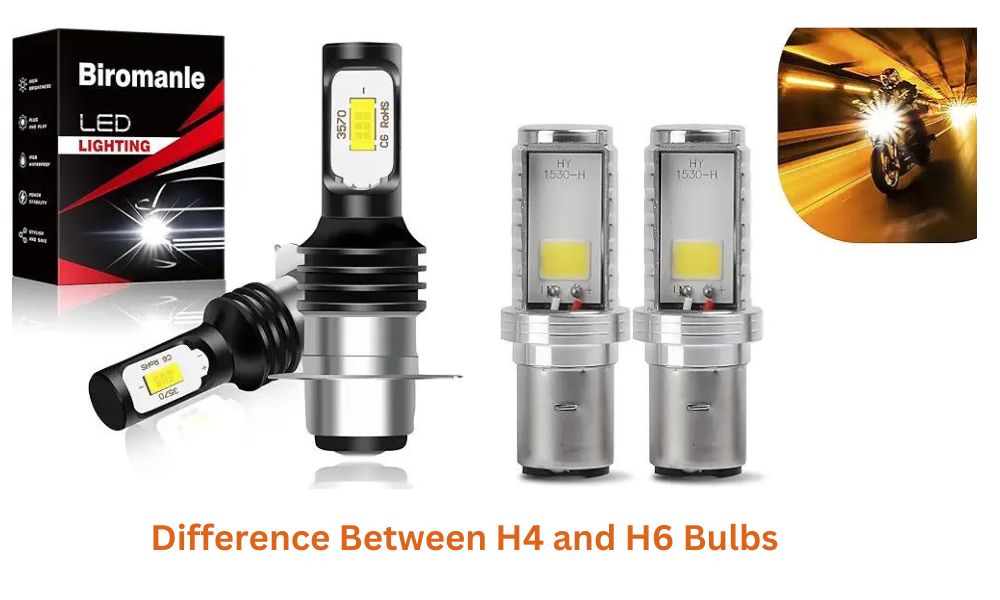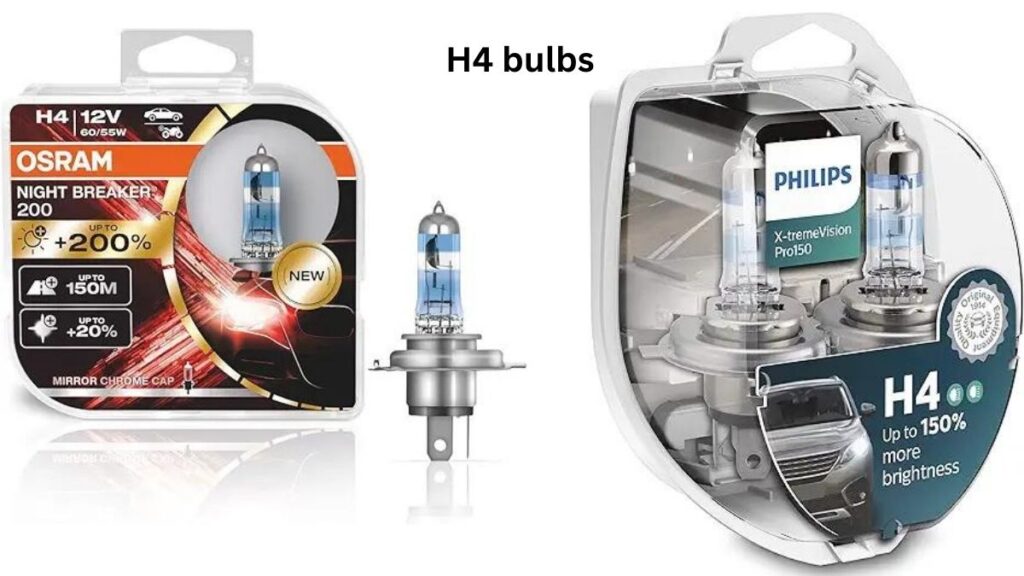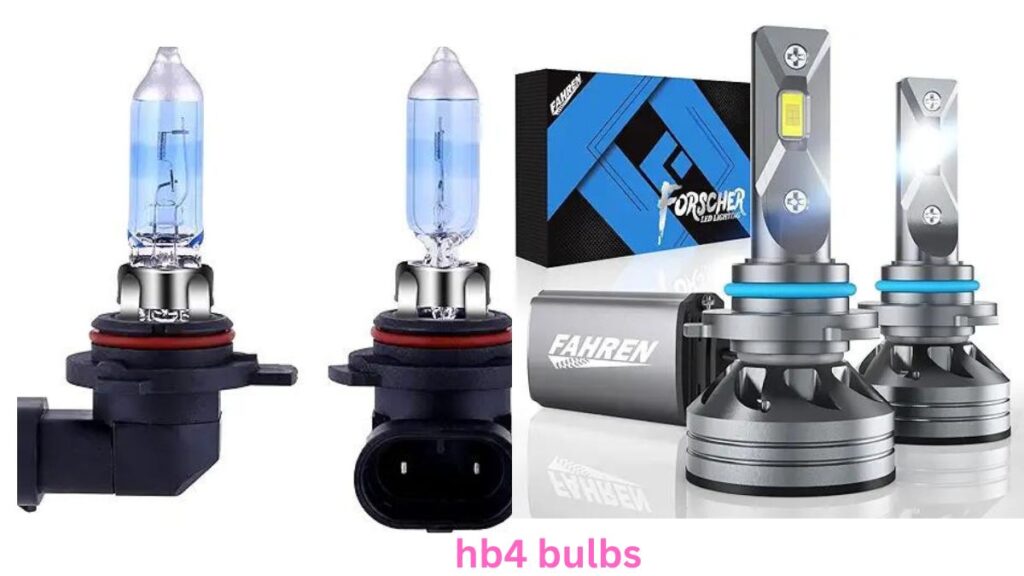Choosing the right headlight bulb for your vehicle can be confusing. There are many options, each with unique features. Two common types are H4 and H6 bulbs. Both have their own benefits and uses. This article will help you understand the differences between H4 and H6 bulbs. We’ll explore their features, pros and cons, and common applications. By the end, you’ll know which bulb is right for you.

What are H4 Bulbs?
H4 bulbs are a popular choice for many vehicles. They have been around for a long time and are known for their dual-beam capability. This means they can produce both high and low beams from a single bulb. This feature makes them versatile and efficient.
Features of H4 Bulbs
1. Dual Filament: H4 bulbs have two filaments. One for the high beam and one for the low beam. This allows for easy switching between beams without needing separate bulbs.
2. High Brightness: These bulbs are known for their bright light output. This makes them ideal for night driving and low-visibility conditions.
3. Long Lifespan: H4 bulbs tend to last longer than other types. This means less frequent replacements and lower maintenance costs.
4. Easy Installation: Most H4 bulbs are easy to install. They fit into standard headlight housings, making them a convenient option.
Pros of H4 Bulbs
- Versatility: The dual-beam capability makes H4 bulbs suitable for various driving conditions.
- Brightness: Their high light output ensures better visibility and safety.
- Durability: They are built to last, reducing the need for frequent replacements.
Cons of H4 Bulbs
- Energy Consumption: H4 bulbs can consume more energy compared to other types. This can put more strain on your vehicle’s electrical system.
- Heat Production: They tend to produce more heat, which can affect other components in the headlight housing.

What are H6 Bulbs?
H6 bulbs are another common type used in vehicles. They are typically found in motorcycles, scooters, and some cars. H6 bulbs are known for their compact size and efficiency.
Features of H6 Bulbs
1. Single Filament: Unlike H4 bulbs, H6 bulbs usually have a single filament. This means they produce only one beam, either high or low.
2. Compact Size: H6 bulbs are smaller and lighter. This makes them ideal for vehicles with limited space.
3. Energy Efficient: These bulbs consume less energy. This makes them a good choice for vehicles with smaller electrical systems.
4. Cooler Operation: H6 bulbs produce less heat, reducing the risk of damage to surrounding components.
Pros of H6 Bulbs
- Energy Efficiency: Their lower energy consumption makes them suitable for smaller vehicles.
- Compact Design: The small size of H6 bulbs allows for easier installation in tight spaces.
- Less Heat: Cooler operation means a longer lifespan for both the bulb and other headlight components.
Cons of H6 Bulbs
- Single Beam: The lack of dual-beam capability can be a limitation. Drivers may need separate bulbs for high and low beams.
- Brightness: H6 bulbs are generally less bright compared to H4 bulbs. This can affect visibility in low-light conditions.
Difference Between H4 and H6 Bulbs:
Now that we’ve looked at the individual features of H4 and H6 bulbs, let’s compare them directly. This will help you understand the key differences and make an informed decision.
1. Brightness
H4 bulbs are generally brighter than H6 bulbs. If you frequently drive at night or in low-visibility conditions, H4 bulbs might be the better choice. Their high light output ensures you can see and be seen.
2. Energy Consumption
H6 bulbs are more energy-efficient. They consume less power, which is ideal for vehicles with smaller electrical systems. If you’re looking to reduce your vehicle’s energy usage, H6 bulbs are a good option.
3. Heat Production
H4 bulbs tend to produce more heat. This can be a concern if your vehicle has sensitive components near the headlights. H6 bulbs, on the other hand, run cooler, reducing the risk of heat-related damage.
4. Lifespan
Both H4 and H6 bulbs are known for their durability. However, the lifespan can vary depending on usage and conditions. Generally, H4 bulbs last longer due to their robust design. But the cooler operation of H6 bulbs can also contribute to a longer lifespan.
5. Versatility
H4 bulbs are more versatile due to their dual-beam capability. They can switch between high and low beams easily. H6 bulbs, with their single-beam design, might require additional bulbs for full functionality.

Common Applications
1. H4 Bulbs
- Cars: H4 bulbs are commonly used in cars due to their high brightness and dual-beam capability.
- Trucks: Their durability and light output make them suitable for trucks and other heavy vehicles.
- Off-road Vehicles: The robust design and versatility of H4 bulbs make them ideal for off-road driving.
H6 Bulbs
- Motorcycles: The compact size and energy efficiency of H6 bulbs make them popular in motorcycles and scooters.
- Scooters: Their lower power consumption suits the smaller electrical systems of scooters.
- Compact Cars: Some compact cars use H6 bulbs due to their smaller size and efficient operation.
Choosing the Right Bulb
When deciding between H4 and H6 bulbs, consider your vehicle’s requirements and your driving needs. If you need high brightness and versatility, H4 bulbs are a great choice. For energy efficiency and compact size, H6 bulbs might be the better option.
Conclusion
Understanding the differences between H4 and H6 bulbs can help you make the right choice for your vehicle. Both types have their unique features and benefits. H4 bulbs offer high brightness and versatility, while H6 bulbs provide energy efficiency and compact design. Consider your specific needs and the pros and cons of each type to choose the best bulb for your vehicle.
Remember, the right headlight bulb can enhance your driving experience and safety. Whether you choose H4 or H6, ensure proper installation and regular maintenance for the best performance.
Related articles:
- Difference between 9W and 12W LED bulb
- Difference between 7w and 9w led bulb
- What is a P21W bulb used for?
- Difference between h4 and h19 bulb


